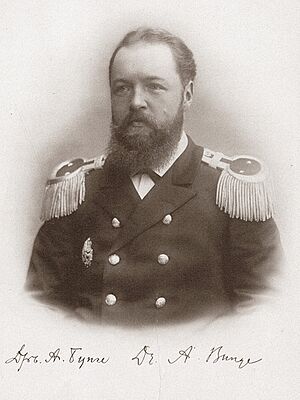Alexander von Bunge (physician) facts for kids
Alexander von Bunge (Russian: Александр Александрович Бунге) was a famous Baltic German doctor, animal scientist (zoologist), and Arctic explorer. He was born on November 9, 1851, in Dorpat (which is now Tartu, Estonia) and passed away on January 19, 1930, in Tallinn, Estonia. Alexander followed in his father's footsteps, as his father, Alexander Georg von Bunge, was also a well-known botanist (plant scientist).
Contents
Discovering Alexander von Bunge
Early Life and Education
From 1870 to 1878, Alexander von Bunge studied at the Imperial University of Dorpat. During his time there, in 1874–75, he also worked as an assistant in the anatomy department, learning about the structure of living things. He earned his medical degree in 1880. The following year, he moved to St. Petersburg, a major city in Russia.
First Steps into Arctic Exploration
In St. Petersburg, Alexander von Bunge joined the Russian Geographical Society. He took part in an important expedition to the Lena River delta from 1882 to 1884. This was a meteorological expedition, meaning its main goal was to study the weather and climate of this cold, northern region.
Adventures in the Far North
Exploring the New Siberian Islands
Alexander von Bunge's most famous adventures took him to the Arctic. In 1885–86, he joined geologist Eduard von Toll on a scientific journey. They explored the Verkhoyansk region and the New Siberian Islands, which are very remote and icy places.
Uncovering Ancient Secrets
During their expedition, Bunge and Toll made exciting discoveries. They found the remains of mammoths and fossils of other large, ancient animals. These findings helped them understand that the New Siberian Islands had a much warmer climate a very long time ago, during a period called the Late Pleistocene (an ancient ice age). Eduard von Toll even named a low, sandy area connecting two islands "Bunge Land" in honor of Alexander.
A Doctor and Explorer's Journey
Starting in 1886, Alexander von Bunge worked as a doctor on various Russian frigates, which are large navy ships. His medical skills were crucial, especially during times of conflict. He served as the head doctor for the Russian Pacific Ocean squadron and marine hospitals in Port Arthur during the Russo-Japanese War.
More Expeditions and Leadership
In 1905, he embarked on another significant expedition. He traveled to the mouth of the Yenisey River by way of the Northeast Passage, a challenging sea route through the Arctic. From 1906 to 1914, he was the head doctor for the Russian Baltic Sea navy. During World War I, he directed several military hospitals in St. Petersburg, caring for many soldiers.
Later Life and Lasting Impact
In 1918, Alexander von Bunge moved to Estonia. He settled at Mõtliku, a farm that he had inherited from his father. He later moved to Tallinn in 1924, where he lived for six more years. He passed away there on January 19, 1930. Alexander von Bunge is remembered for his important contributions as a doctor, a zoologist, and a brave explorer of the Arctic. His work helped us understand more about the Earth's polar regions and its ancient past.


